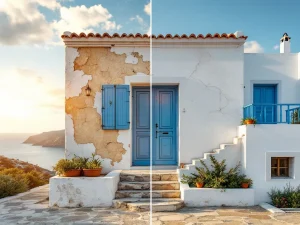If you’re planning to build or renovate a property in Greece, navigating the country’s building permit system is essential. Greek law distinguishes between different categories of permits depending on the scale, purpose, and technical impact of the construction work. Whether you are constructing a new home or making minor upgrades, understanding these permit types will help ensure your project complies with national and local regulations.
The two main categories of permits are the Full Building Permit (Οικοδομική Άδεια) and the Small-Scale Building Permit (Έγκριση Εργασιών Μικρής Κλίμακας). Each has specific criteria, submission requirements, and approval processes governed by Greek law and the national electronic permitting system known as e-Άδειες.
When Do You Need a Full Building Permit in Greece?
The Full Building Permit is necessary for major construction projects such as building a new house, extending an existing structure, or making structural changes that affect the stability of a building. This permit is also required for large-scale earthworks, excavation deeper than 0.8 meters, and the construction of swimming pools or retaining walls. To obtain a full permit, the applicant must submit a detailed dossier that includes architectural designs, structural calculations, energy efficiency studies, geotechnical reports if needed, and various technical plans.
These documents are reviewed by the local Building Service through the national electronic permitting platform, known as My TEE. Once approved, the permit is typically valid for four years in residential cases and up to six years for more extensive projects. Processing time varies but generally takes up to 45 working days, provided all necessary documentation is complete and compliant with current legislation.
What Is a Small-Scale Building Permit and When Is It Used?
For less complex projects, a Small-Scale Building Permit is often sufficient. This applies to work that does not impact the building’s structural integrity or increase its volume. Common examples include interior renovations that do not alter load-bearing walls, facade repairs, and external painting, if scaffolding is needed, installation of pergolas or small garden structures, and upgrades such as thermal insulation or solar panels. Even relatively minor additions, such as small pools under 50 square meters or temporary construction site offices, may require this type of approval. The application process is simpler and faster than that of a full permit, but still requires submission through a licensed engineer who ensures all technical and legal standards are met. A Small-Scale Building Permit is typically valid for one year, with the possibility of renewal.
Are There Any Works That Don’t Require a Permit in Greece?
It’s also important to note that some very basic works, such as painting without scaffolding or interior cosmetic updates, might fall outside the scope of required permits altogether. However, this should always be verified in consultation with a qualified architect or civil engineer, as unauthorized works, even minor ones, can lead to fines, legal complications, or obstacles in selling the property later.
Why Is It Important to Follow the Building Permit Process?
Greek property law is comprehensive and regulated by both national and European Union standards, ensuring that all construction and renovation work complies with safety, seismic, and environmental regulations. For this reason, even if a project seems minor, it’s strongly recommended to involve a professional who can navigate the permitting system on your behalf.
How Can You Ensure Your Project Is Fully Compliant?
In conclusion, the type of permit you need in Greece depends entirely on the scale and scope of your construction or renovation. Whether you’re planning a new build or simply adding a pergola, following the proper permitting procedures is not only a legal obligation but also a crucial step in safeguarding your investment. For peace of mind and legal clarity, always work with licensed professionals who are familiar with local building codes and administrative procedures.



































